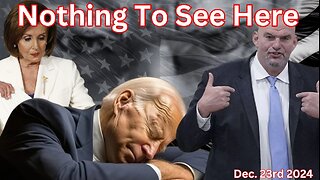Premium Only Content

Seeds of Dissent: Mark Oshinskie on Judicial Failures and COVID Overreach
Mark Oshinskie, an attorney turned writer, brings a unique perspective to his work, influenced by his 30 years of environmental litigation and his decade of growing food and flowers. "I practiced environmental litigation for 30 years, in courtrooms on my feet, which informs my writing. For the last 10 years, I’ve grown food and flowers for a living, seeing the cycle of life firsthand," Oshinskie shares, emphasizing the profound impact of these experiences on his worldview.
His journey into writing began with the onset of the COVID-19 pandemic. Oshinskie felt compelled to document what he perceived as an overreaction to the crisis. "I began writing when the COVID madness began, chronicling what I call the 'scamdemic.' My book is a series of essays that draw on stories from my upbringing and the pandemic," he explains. These essays provide a personal and anecdotal account of his observations, countering the prevalent narratives with his own experiences and insights.
Oshinskie's perspective on life and health is deeply rooted in his gardening practices. "To grow a garden, one sees the cycle of life: things sprout, mature, become fruitful, and die. Humans are the same way. People overreacted to COVID, especially regarding the deaths of 90-year-olds in nursing homes," he notes. This cyclical view of life has informed his critical stance on the societal response to the pandemic.
His outspokenness did not come without consequences. "Medium censored me because of some of the bad things I said about the shots. Someone reported me, and I almost lost my job over it," Oshinskie recounts, highlighting the challenges he faced in voicing his dissenting opinions. Despite these setbacks, he continued to share his views on platforms like Substack.
Oshinskie draws a parallel between the health of plants and humans, suggesting that proper self-care can minimize the need for medical intervention. "If a plant is healthy, it doesn’t have bugs. Bugs detect weakness in plants and tend to attack. The same is true of humans: if people take care of themselves, they require very little medical care," he asserts. He criticizes the over-reliance on medications, arguing, "There’s a whole lot of people taking medications they don’t need, which cause harmful effects and enable bad behavior. People feel that as long as they take their pills, they can eat poorly or avoid exercise."
Throughout his writings, Oshinskie emphasizes the importance of personal observation and critical thinking. "People understand life through stories. We were hit with a lot of statistics and images of people dying, but I wanted to bring it back to what I saw with my own eyes, not accepting others’ representations of reality," he reflects, urging readers to question the narratives presented to them.
His legal career also reflects his commitment to challenging authority. "I represented people for free in a case against my town's ordinance requiring the removal of trees that raised sidewalks. We won the case, but the judge spitefully awarded me a minimal fee, leading me to quit practicing law," he recalls. This experience reinforced his belief in the existence of political and personal biases in the justice system. "I think the refusal to give me a fair fee was political and personal because I’m a political and demographic outsider. This mirrored the government’s refusal to admit critics were right about the COVID overreaction," Oshinskie argues.
Ultimately, Oshinskie's writing serves as a vehicle for expressing his discontent with societal norms and encouraging others to think independently. "Writing was my way of expressing the disconnect between what I saw and what really should have been. I wanted people to look at their lives, what’s happened, and what’s being proposed, and tell me it makes sense," he concludes, inviting readers to engage in critical reflection and dialogue.
-
 1:42:21
1:42:21
The Quartering
13 hours agoTrump To INVADE Mexico, Take Back Panama Canal Too! NYC Human Torch & Matt Gaetz Report Drops!
143K100 -
 2:23:15
2:23:15
Nerdrotic
13 hours ago $12.44 earnedA Very Merry Christmas | FNT Square Up - Nerdrotic Nooner 453
110K11 -
 1:14:05
1:14:05
Tucker Carlson
13 hours ago“I’ll Win With or Without You,” Teamsters Union President Reveals Kamala Harris’s Famous Last Words
204K366 -
 1:58:31
1:58:31
The Dilley Show
13 hours ago $34.00 earnedTrump Conquering Western Hemisphere? w/Author Brenden Dilley 12/23/2024
154K40 -
 1:09:59
1:09:59
Geeks + Gamers
14 hours agoSonic 3 DESTROYS Mufasa And Disney, Naughty Dog Actress SLAMS Gamers Over Intergalactic
105K21 -
 51:59
51:59
The Dan Bongino Show
15 hours agoDemocrat Donor Admits The Scary Truth (Ep. 2393) - 12/23/2024
904K3.03K -
 2:32:15
2:32:15
Matt Kohrs
1 day agoRumble CEO Chris Pavlovski Talks $775M Tether Partnership || The MK Show
137K34 -
 28:23
28:23
Dave Portnoy
1 day agoDavey Day Trader Presented by Kraken - December 23, 2024
168K44 -
 59:29
59:29
BonginoReport
17 hours agoTrump, Murder Plots, and the Christmas Miracle: Evita + Jack Posobiec (Ep.110) - 12/23/2024
171K149 -
 2:59:14
2:59:14
Wendy Bell Radio
19 hours agoNothing To See Here
135K80